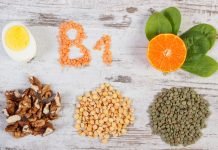Vitamin E
Vitamin E is an antioxidant and is fat-soluble. It may help to protect your cells from damage. According to Deborah Weatherspoon from Healthline “the term “vitamin E” describes eight different compounds. Alpha-tocopherol is the most active one in humans”. (1)
The best way to get the vitamin E you need is by eating a healthy diet. Vitamin E can found in lots of foods, mainly oily fish like mackerel, fresh tuna, sardines, salmon and herring. It is also in peppers, blueberries, pomegranate, apples, acai berries, certain nuts, wheat germ oil, bee pollen and wheatgrass.
Vitamin E may help with
- Arthritis
- Alzheimer’s and brain function
- Athletic performance and recovery
- Premature ageing and wrinkles
- High blood pressure
Benefits
1) Relieves arthritis
Vitamin E can reduce the symptoms of arthritis. It protects cells from oxidative stress which can prevent damage from free radicals. Oxidative stress can increase the pain and inflammation associated with rheumatoid and osteoarthritis.
Lycopene and or N-acetyl-cysteine could work well with vitamin E to remove these toxins from the body.
2) Alleviates Alzheimer’s and improves brain function
Alzheimer’s may be related to oxidative damage. Vitamin E could protect brain function and reduce the symptoms of diseases that affect the brain.
3) Supports athletic performance and recovery
Vitamin E may help athletic performance and recovery by reducing free radical activity and muscle damage from strenuous exercise. Making sure you consume enough vitamin E can help improve your exercise performance.
4) Premature ageing and wrinkles
Free radicals can damage skin cells and cause premature wrinkles, especially in individuals that smoke and spend a lot of time in the sun. Many face creams contain vitamin E to counter free radicals and help alleviate premature ageing.
Vitamin E can also help to restore the average serum concentration of copper and zinc. Getting enough copper and zinc can help to maintain skin health. (3)
5) Reduces blood pressure
Vitamin E helps to maintain circulatory health and correct blood flow, which may help with high blood pressure.
According to the National Library of Medicine, taking 200 IU of vitamin E a day can reduce blood pressure in patients with mild hypertension. (2)
Vitamin E works well with
- Zinc to promote wound healing and reduce scarring
- Selenium to help protect against oxidative stress
- Fish oils to help maintain healthy circulation and lower blood pressure
- Glucosamine and chondroitin to relieve arthritis
- Vitamin C for anti-ageing properties and to protect against oxidative damage to the cells and tissues
- Coenzyme Q10 and vitamin C to reduce swelling of the gums (periodontitis)
- Horse Chestnut for healthy veins and circulation
- Hawthorn to support athletic performance and stamina
- Collagen to reduce wrinkles and promote healthy skin, joints and bones
- Alpha-lipoic acid to enhance the effects of vitamin E
- Evening primrose oil to reduce the symptoms of skin problems including acne and eczema
Vitamin E deficiency
According to the University of Maryland Medical Center, individuals who cannot absorb fat properly can develop vitamin E deficiency. The symptoms of severe vitamin E deficiency include muscle weakness, reduced muscle mass, abnormal eye movements, vision problems and an unsteady gait. Long-term vitamin E deficiency can cause liver and kidney problems.
Most people in the United States have slightly low levels of vitamin E but are not seriously deficient. (4)
Some things to consider
Vitamin E toxicity is rare, and supplements are generally safe. Supplements may increase your blood pressure temporarily when you first start using them, so you should start with a low dose of 100IU. Consult your doctor before taking vitamin E supplements if you suffer from high blood pressure.
How much do you need?
The UK National Health Service states that on average, you need:
- 4mg a day for men
- 3mg a day for women
You should be able to get all the vitamin E you need from your diet. Your body stores excess vitamin E for future use, so you don’t need it in your diet every day. (5)
Resources:
- https://www.healthline.com/health/all-about-vitamin-e
- https://www.ncbi.nlm.nih.gov/pubmed/12463106
- https://www.ncbi.nlm.nih.gov/pubmed/18946458
- https://www.mountsinai.org/health-library/supplement/vitamin-e
- https://www.nhs.uk/conditions/vitamins-and-minerals/vitamin-e/






